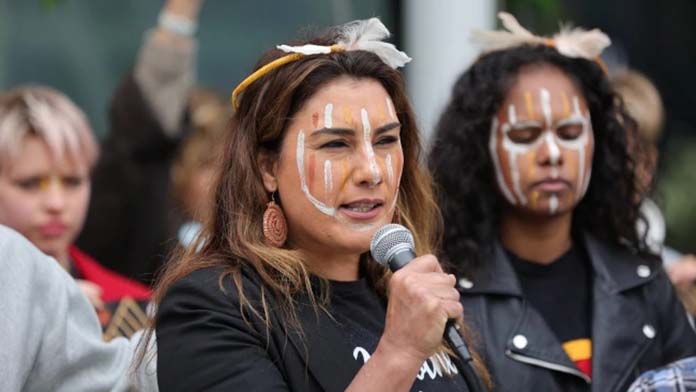Lidia Thorpe’s resignation from The Greens has exposed the limits of the party’s radicalism and invigorated the debate about the Indigenous Voice to Parliament.
Thorpe’s cry that there is a desperate need to “grow and amplify a Blak sovereign movement in this country” has struck a chord with many who have watched in despair as the new Labor government supports resource companies attacking Aboriginal land, extends punitive Intervention-style measures in the NT and fails to act on mass incarceration and child removal.
Thorpe’s move was driven by The Greens’ uncritical support of the Voice in the face of significant opposition from Indigenous activists in and outside the party. While she has not declared which way she will vote in the referendum, she is right to say, “There is a progressive No vote out there.”
Thorpe’s strongest ground is when she insists that the Voice is not going to deliver the recommendations of the Royal Commission into Black Deaths in Custody, change the rates of child removal, or do anything about Indigenous poverty or land rights.
Thorpe says she want to “fully represent” the grassroots Black sovereign movement.
There is no doubt we need a movement. The fact that there was not one protest in Alice Springs or anywhere else in response to the government re-imposing measures that mirrored the Intervention is one indication of that.
Indigenous people in the Northern Territory and in the Pilliga in NSW are fighting separate attempts by mining companies to develop gas projects on Indigenous land, but these are not often linked to a wider Indigenous rights movement.
Treaty?
While calls for Treaty reflect a demand for something more substantial than the Voice, the actual content of any proposed Treaty is also vague. Thorpe has suggested that a Treaty could deliver ten Black senators who would “have real power”. This seems to reflect an idea that goes no further than The Greens’ view that real power is in parliament. Yet Thorpe has already experienced the limitations of that strategy.
No Treaty negotiated with the Australian state is going to give “real power” to any Black senators who might be elected.
But there is also a more basic problem with the idea of a Treaty. Any Treaty would amount to a compromise with Australian capitalism.
Stan Grant argues that treaties signed by the Maori and Native Americans mean that First Nations people are recognised as “sovereign”. But this simply amounts to token recognition of Indigenous people in exchange for treaties that have left them deprived of their land and subject to on-going discrimination.
Real sovereignty would mean Indigenous control of Indigenous affairs, real land rights that could prevent mining on Indigenous land, and an end to the homelessness, poverty and deprivation that blights Indigenous lives.
Australian capitalism is not going to grant that kind of self-determination, or negotiate a Treaty recognising such rights. They will have to be fought for.
It is crucially important to recognise the nature of that struggle. There is no doubt that the European invasion, and the state it gave rise to, excluded Indigenous people and was founded on racism.
The ruling class implemented a “White Australia” policy, creating a virulent racist nationalism to entrench the mythology that white workers and white bosses had a common interest.
But the Australian constitution is about Australian capitalism; it does not contain rights for non-Indigenous workers, migrants or women either.
Racist ideology has infected the working class and must be consciously fought. But there is also a tradition of anti-racism in the Australian working class, recognising a common struggle with Indigenous people against a common enemy.
From the Pilbara strike in 1946, to the Gurindji strike for land rights in 1966, the struggle at Nookanbah against mining companies in 1980, to Jabiluka and the more recent fight against nuclear waste dumps, solidarity from the union movement was central.
Black liberation won’t come about through a Treaty with the Australian state. Thorpe herself is scathing about the Treaty process in Victoria. To win Black liberation, the Australian state will have to be smashed.
There is an old slogan “No socialism without women’s liberation and no women’s liberation without socialism”. The same applies to Indigenous sovereignty.
It is united class struggle that has the power to win real gains within capitalism, but also the power to overthrow it. The tens of thousands, Black and white, who turned out for the Black Lives Matter rallies in 2020 and the growing numbers that attend Invasion Day protests show the potential for a real struggle.
Thorpe’s resignation has drawn attention to the widespread anger and frustration among Indigenous activists that, for all the talk about the Voice, the voices of grassroots Indigenous struggles are still being ignored. The challenge is to build a movement that can’t be ignored or bought off.
By Ian Rintoul






